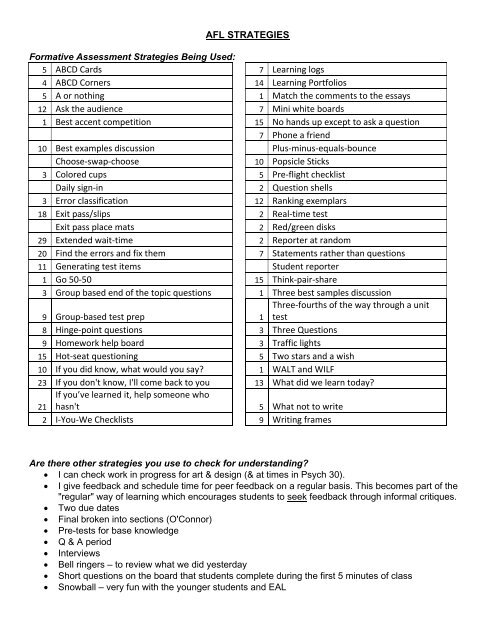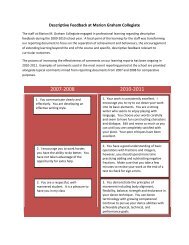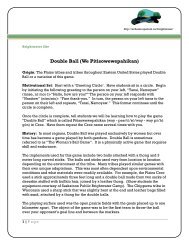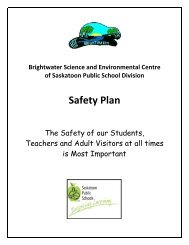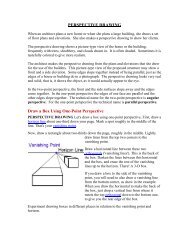AFL STRATEGIES 5 ABCD Cards 7 Learning logs 4 ABCD Corners ...
AFL STRATEGIES 5 ABCD Cards 7 Learning logs 4 ABCD Corners ...
AFL STRATEGIES 5 ABCD Cards 7 Learning logs 4 ABCD Corners ...
You also want an ePaper? Increase the reach of your titles
YUMPU automatically turns print PDFs into web optimized ePapers that Google loves.
<strong>AFL</strong> <strong>STRATEGIES</strong><br />
Formative Assessment Strategies Being Used:<br />
5 <strong>ABCD</strong> <strong>Cards</strong> 7 <strong>Learning</strong> <strong>logs</strong><br />
4 <strong>ABCD</strong> <strong>Corners</strong> 14 <strong>Learning</strong> Portfolios<br />
5 A or nothing 1 Match the comments to the essays<br />
12 Ask the audience 7 Mini white boards<br />
1 Best accent competition 15 No hands up except to ask a question<br />
7 Phone a friend<br />
10 Best examples discussion Plus‐minus‐equals‐bounce<br />
Choose‐swap‐choose 10 Popsicle Sticks<br />
3 Colored cups 5 Pre‐flight checklist<br />
Daily sign‐in 2 Question shells<br />
3 Error classification 12 Ranking exemplars<br />
18 Exit pass/slips 2 Real‐time test<br />
Exit pass place mats 2 Red/green disks<br />
29 Extended wait‐time 2 Reporter at random<br />
20 Find the errors and fix them 7 Statements rather than questions<br />
11 Generating test items Student reporter<br />
1 Go 50‐50 15 Think‐pair‐share<br />
3 Group based end of the topic questions 1 Three best samples discussion<br />
9 Group‐based test prep 1<br />
Three‐fourths of the way through a unit<br />
test<br />
8 Hinge‐point questions 3 Three Questions<br />
9 Homework help board 3 Traffic lights<br />
15 Hot‐seat questioning 5 Two stars and a wish<br />
10 If you did know, what would you say? 1 WALT and WILF<br />
23 If you don't know, I'll come back to you 13 What did we learn today?<br />
21<br />
If you’ve learned it, help someone who<br />
hasn't 5 What not to write<br />
2 I‐You‐We Checklists 9 Writing frames<br />
Are there other strategies you use to check for understanding?<br />
I can check work in progress for art & design (& at times in Psych 30).<br />
I give feedback and schedule time for peer feedback on a regular basis. This becomes part of the<br />
"regular" way of learning which encourages students to seek feedback through informal critiques.<br />
Two due dates<br />
Final broken into sections (O'Connor)<br />
Pre-tests for base knowledge<br />
Q & A period<br />
Interviews<br />
Bell ringers – to review what we did yesterday<br />
Short questions on the board that students complete during the first 5 minutes of class<br />
Snowball – very fun with the younger students and EAL
Three, then me – ask three others for help, then me (works well in the lab when kids have lots of<br />
questions)<br />
Plus/minus/interesting<br />
One or two fingers<br />
All my strategies stem from these.<br />
I am looking forward to having the kit – especially the techniques – short guide you are providing!<br />
Random student dart board. Students ask a question to clarify – written question and response.<br />
4-Corner Debater<br />
Three-to-try (three questions I mark on the spot with feedback as I return them)<br />
Segmented tests (one part, then review, then another, then review…<br />
Random student selector using a virtual dart board or "pick-a-number"<br />
I review all the students' work; I ask students to "try again" on some assignments or they are<br />
required to correct their errors after reviewing concepts/reading.<br />
Entrance slips<br />
Corrective instruction and team teaching (x 2)<br />
I use "check points" very frequently (no marks) (x 3)<br />
Mini-quizzes that tell me where they're at in their understanding. May re-write these as many times<br />
as they wish until the unit exam. The re-write is not the same.<br />
Peer assessment<br />
Thumbs up, thumbs down, thumbs middle to check for understanding or clarity of instructions<br />
Journals<br />
Simply "surveying" student work as they progress through a problem/question.<br />
As my students are working on projects, I am constantly moving around the classroom to help<br />
students individually.<br />
Confusion is very obvious in my class, as a project-based course.<br />
Checkpoints – 10 marks for 10 questions to check for understanding<br />
Communication with classroom teacher(s)<br />
Which strategies fit you and your style best?<br />
I like all of the ones I've checked.<br />
Exit/entrance pass<br />
Portfolios (x 2)<br />
No hands-up (x 3)<br />
1-1 because of resource and lots are used each day<br />
Ones that are short so I can combine multiple activities in a class period and know when there is<br />
understanding<br />
Good for flexible grouping<br />
Quick and easy to integrate into instruction.<br />
Strategy will vary with grade level and subject taught<br />
Language-based assessment strategies<br />
Popsicle sticks (x 2)<br />
phone a friend<br />
Ranking exemplars (x 2)<br />
Match comments to writing<br />
Two starts & a wish<br />
Extended wait time<br />
I have liked most everything I have tried.<br />
I'll come back to you<br />
A or nothing<br />
Unsure<br />
Random questioning
Questioning techniques as I do a lot of examples looking for student input. This random student<br />
selector makes everyone eligible to answer potential questions and not just the ones that know.<br />
Getting students to work cooperatively; they help one another to learn. (x 2)<br />
All<br />
Check points work very well, especially with weaker students and before a quiz/test. (x 3)<br />
Find errors<br />
Hot-seat<br />
Those which involve students interacting with other students<br />
Things that are quick and not time consuming – do not want to take up a lot of class time.<br />
Small group activities<br />
Anything that promotes social skills<br />
Have you seen a change in student achievement in your classes? How?<br />
Students generally feel empowered to direct their own learning.<br />
Low end had (literally) more chances for passing<br />
It is difficult to determine the differences in student achievement based on these strategies (ie.<br />
there is no data to support – control group is uncontrolled group). However, students are engaged<br />
in the class discussions, which is a positive.<br />
Not as of yet, unsure, too soon to tell (x 6)<br />
They enjoy it, but I think it is the novelty of each item<br />
More engagement than achievement<br />
When used compared to traditional methods, much more success is seen.<br />
Students seem to always respond to variety. The more you can take content and re-package it in<br />
an interesting way, the more engagement you will have.<br />
Performance this semester has been very good compared to past years, but I would attribute this<br />
to the quality of the students.<br />
Kids more freely ask questions and get involved in class discussions<br />
They feel comfortable to admit they don't understand.<br />
Some movement upward in achievement – particularly for low to middle achievers.<br />
Downside – declining respect for deadlines<br />
In some cases<br />
I don't have popsicle sticks, but I do "no hands up" and randomly call on students during<br />
discussions – I think this has increased individual engagement for many.<br />
When I use them (strategies), there is generally engagement – ownership.<br />
More engaged<br />
Exemplars have made the largest impact in my class: for students to know what past students<br />
have done and what is successful or not.<br />
I think I have a better idea of when I can stop instructing the group and let them work so I can help<br />
individuals.<br />
Not sure, first unit exam – absolutely no one failed; was it this, I don't know?<br />
Yes, if they do poorly on a check point, they go back over their material and re-write it. They are<br />
motivated by "boosting their mark", but what's really happening is that their picking up on the<br />
concepts they missed.<br />
Great class discussions develop in class, better retention for quizzes/tests.<br />
Many of these practices I have been trying to work on and become more consistent. Having the<br />
resources and time to work on these methods have improved my teaching and have improved the<br />
engagement of students in my classes and have improved their learning and their confidence in<br />
terms of knowing they have the skills to gain more understanding.<br />
Yes! Students are more aware of where they are going wrong!<br />
White boards were mediocre; real ones would be better if we could spring for the cost.


